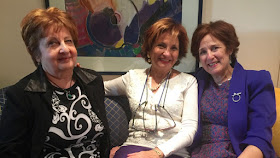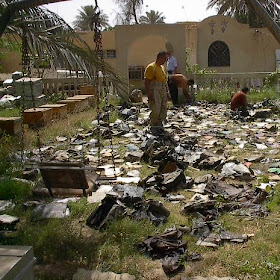In 1965, the Tunisian leader Habib Bourguiba suggested that the Arab world bury the hatchet with Israel. But Bourguiba was thwarted by Egyptian president Gamal Abdel Nasser. In an impulse carried over from the Nazi era, swept up by the anti-Jewish hysteria of the Arab Street, Nasser embarked on the path to war to 1967 - a war that would result in a catastrophic Arab defeat. Must-read by Mattias Kuntzel in Fathom magazine. (With thanks: Lily)
Nasser was born in 1918. In 1935 or 1936 he became a member of the
Young Egypt Society led by Ahmad Hussein – a radical nationalist
movement that was pro-Nazi in several respects. ‘The Second World War
and the short period before it fired the spirit of our youth,’ wrote
Nasser, ‘and moved our whole generation towards violence.’
[29]
Leading members of the Young Egypt Society included Ali Maher and Aziz
al-Misri, two prominent Egyptian politicians who were known for their
anti-British and pro-Axis stance.
[30]
In 1937, Nasser entered the Military Academy. In 1938, the core of
the Free Officers movement that would take power in 1952 was formed.
When in 1942 ‘the Germans were close to Egypt’, recalled movement member
Abdel Latif Boghdadi, we ‘thought it our duty to do something against
the British. We formed a secret organisation in the Air Force to disrupt
and impede the British withdrawal from the Western Desert by sabotaging
their lines of communication and supply.’
[31]
In 1943, Nasser and some of his military colleagues held meetings
with Mahmud Labib, a leading member of the Muslim Brotherhood. Those
gatherings took place once a week and ‘continued uninterrupted until May
1948, when mobilisation for the Palestine war [of 1948] occurred.’
[32] In the 1930s the Brotherhood had received financial aid from Nazi Germany because of its antisemitic orientation.
[33]
Thus, in 1947, Hassan al-Banna, the Brotherhood’s leader, explained the
United Nations decision in favour of a partition of Palestine in
antisemitic terms, deeming ‘the whole United Nations intervention to be
an international plot carried out by the Americans, the Russians, and
the British under the influence of Zionism.’
[34] In 1948, the Brotherhood was nevertheless by far the largest political organisation in Egypt with at least one million members.
[35]
Nasser was among those officers who provided lengthy clandestine
training to the Brothers in preparation for the Palestine war of 1948.
It was thus no accident that in 1949 Nasser’s name was found on a manual
about grenades in a Muslim Brotherhood hideout.
[36]
After the Free Officers’ revolution had swept away the monarchy and the
old power elites in July 1952, ten of the fourteen officers now running
the country had, at one time or another, sworn loyalty to the
Brotherhood.
[37] With good cause the Soviets condemned the ‘reactionary officers’ group’ and their new ‘military dictatorship’.
[38]
In 1942, at British instigation, Aziz al-Misri and Ali Mahir had been
dismissed because of their explicit pro-German stance; both were
reinstated ten years later by the Free Officers: Al-Misri was hailed as
the ‘spiritual father’ of the July revolution and the Officers made Ali
Mahir the new prime minister.
[39]
It was not by chance that Egypt was henceforth to become the El Dorado
of former Nazis war criminals and antisemites. One example is that of
air force officer Mohammad Radwan. He had managed to reach the German
lines during the war. He made his way to Germany, where he was arrested
by the Allies in 1945 and then sentenced in Egypt to fifteen years in
jail. In 1952, he was released and then employed in the Armed Forces’
Department of Public Affairs.
[40]
Another is neo-Nazi publisher Helmuth Kramer: He received political
asylum in Egypt in 1965 after a German court had found him guilty of
‘spreading Nazi ideas’. According to Kramer, Nasser personally dealt
with his asylum request and gave permission for him to continue
publishing his books.
[41]
Since Moscow had refused to deliver intermediate-range rockets to
Egypt in 1959, Nasser invited more than 300 German engineers and
scientists who had formerly worked for the Nazi government to develop
such missiles. In 1962, missiles were for the first time on display at a
Cairo parade. ‘The staff of the Israeli embassy in Paris mourns and the
Jews in New York are in fear,’
Al-Ahram rejoiced.
[42]
Though Nasser denied being an anti-Semite (‘I have never been anti-Semitic on a personal level’
[43])
he emphasised the great relevance of the Protocols of the Elders of
Zion for an understanding of world affairs and claimed publicly that
‘three hundred Zionists … govern the fate of the European Continent’.
Whoever believes such a thing must of course deny the Holocaust. Nasser
denied it both directly (‘No one … takes seriously the lie about six
million Jews who were murdered’
[44]) and indirectly, by claiming that ‘Ben-Gurion … has killed as many Arabs as Hitler killed Jews.’
[45]
Whoever believes in the Protocols will also seek to destroy Israel.
And, indeed, Nasser’s obsession with the Jewish state was a constant
theme of his time in power. Firstly, he considered Israel a bridge-head
of Western imperialism, a conspiracy theory that gained some credibility
after Israel’s involvement in the Suez crisis of 1956.
[46]
Second, he considered Israel to be expansionist by nature. ‘Arab unity
means the liquidation of Israel and the expansionist dreams of Zionism’
he told a crowd in 1965.
[47]
Nasser’s background did not of course rule out a later change of
course. In 1953, his friend and combatant Anwar al-Sadat praised Adolf
Hitler as an ‘immortal leader’ but 26 years later recognised Israel’s
right to exist. Why was Nasser incapable of making such a move?
This is where the radical anti-Zionism of the ‘Arab street’ enters
the picture. It may well be that it was the mass enthusiasm which
flooded Egypt on the eve of the Six-Day War that kept Nasser on the path
to war.
The Arab world had reacted ecstatically to Egypt’s Sinai move in May
1967.
After the withdrawal of the UNEF troops, Cairo looked more like a
carnival than a city preparing for war: ‘The City was now festooned with
lurid posters showing Arab soldiers shooting, crushing, strangling, and
dismembering bearded, hook-nosed Jews.’
[48] The closure of the Straits of Tiran worked like magic: Now, Nasser’s
Ahlan Wa-sahlan (‘You
are welcome’) reverberated throughout the Arab world. ‘Congratulations
and messages of support poured in from all capitals. Delegations began
to arrive in Cairo from Iraq, Syria, Algeria, Kuwait and other
countries.’
[49] Overnight, Nasser’s prestige in the Arab world had soared to new heights.
This enthusiasm, this fervent hope for the destruction of an
established state is quite exceptional. In 1945, the Arab League was
founded with the goal of preventing the creation of Israel. So far,
nothing out of ordinary: many emerging countries initially met with
resistance and had to fight for their right to exist. But what followed
was altogether exceptional, as Ruth R. Wisse explains:
Israel won its [1948] War of Independence, but … Arab leaders did not
acknowledge Israel’s independence. Though the world was now dealing
with a Jewish country rather than a dispersed people, the political
functions of Israel in Arab politics became almost identical to the
functions of the Jew in the politics of Europe. … Arab leaders forged a
target and scapegoat.
[50]
It was this Arab response that rendered Israel exceptional despite
its successful establishment as a state. ‘Zionism was politically
unexceptional – dozens of new countries have joined the United Nations
since 1948. The exception was anti-Zionism: the organisation of politics
against the Jewish state.’
[51]
Merely anti-Zionism? ‘The Arab side is agitating the masses by
purposely not separating Anti-Zionism from antisemitism,’ stated Habib
Bourguiba in 1965.
[52]
He was right: Arab leaders adopted the texts, images, and tactics of
European antisemitism. ‘With the ideological inversion that is at the
heart of antisemitism,’ observes Wisse, ‘they denied the Jews their
country and accused them of denying the Arabs theirs.’
[53]
Antisemitic agitation in Arab countries, based on European models,
was nothing new, as recent studies of Nazi antisemitic propaganda in the
Arab world have proved.
[54]
For example, from April 1939 to April 1945, daily Arabic language radio
broadcasts from Berlin constantly urged their Arab listeners to prevent
the birth of a Jewish state and to exterminate the Jews living in
Palestine. These antisemitic programs were popular and widely heard.
Time and again they claimed that Zionism was inherently expansionist and
aspired to destroy Islam.
The closer the defeat of Nazi Germany came,
the shriller became the broadcasts’ warnings about the consequences for
Palestine should ‘World Jewry’ seize its opportunity. What was the
significance of this for Nasser’s 1967 decisions?
We know that the Nazis’ radio propaganda continued to reverberate
after Germany’s defeat. While the view of the British Foreign Office,
which in 1946 ‘spoke of Arab hatred of the Jews being greater than that
of the Nazis’, may be exaggerated,
[55]
it is clear that wartime Nazi propaganda contributed to increased
hostility after the war. Certain Arab countries, observed Bernard Lewis,
‘have been the only places in the world where hard-core, Nazi-style
antisemitism is publicly and officially endorsed and propagated.’
[56]
Historians of the Middle East agree that it was to a large extent the
pressure from the ‘Arab street’ that had previously driven a reluctant
Arab League into a full-scale war against Israel in 1948.
[57]
Egypt’s prime minister Mahmud al-Nuqrashi Pasha, for example, was
against the military assault that took place in 1948. However, he said
he was swayed by public opinion that ‘was all in favour of the war, and
considered anyone who refused to fight as a traitor.’
[58]
In 1948, the Muslim Brotherhood in particular had created an atmosphere
in which war seemed the only logical and natural process: ‘The
[Brotherhood] Society succeeded in drawing Egypt into a full-scale
military initiative in Palestine.’
[59]
In 1967 this constellation reappeared, but in a new form.
In 1967, 22 years after World War Two, the direct reverberations of
Nazi propaganda hardly played a role. Instead, the Arab defeat of 1948 –
neither reflected on nor really admitted
– seemed to require
revenge. At the same time, Arab rulers profited from the prevailing mood
by using anti-Jewish scapegoating to divert their peoples’ attention
from their own failures. According to Bourguiba’s analysis of 1965,
Arabs and Israelis ‘would be able to live in harmony after having
mutually ridded themselves of their complexes and their extremists’.
This kind of clean-up, however, never began.
Conclusion
Behind the question of whether Nasser could have resisted the ‘Arab
street’ in 1967 lies another: why did he incite their mass fury in the
first place? In my view, the main cause of both Nasser’s decision and
the subsequent enthusiasm of his followers was the antisemitic impulse
as it was carried over from the Nazi period to the post-war period and
then to the next generation.
It was neither Israel nor Zionism that provoked the 1967 war but the latent anti-Zionism and antisemitism in the Arab world.
Read article in full



















